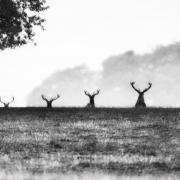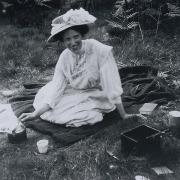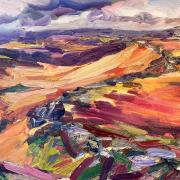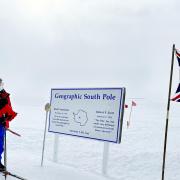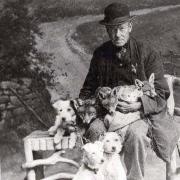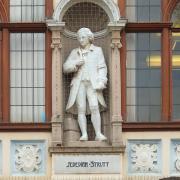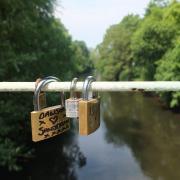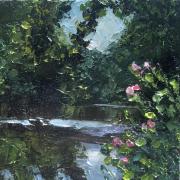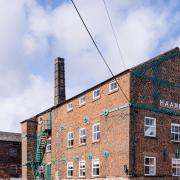My mother had been a ‘ladies-maid’ and my grandmother had allegedly cooked for Queen Mary, so it was a given that a Royal album would be wedged into my Christmas pillowcase every year.
My mother obviously took notes as I was by far the best turned out ‘boom baby’ in our road. Tweed coats with velvet collars, start-right shoes, viyella dresses hand smocked by my mum; my wardrobe was as close to a princess as you could get.
My father was a bus driver, the kind of ‘black lamb’ of a well-known farming family in Derbyshire.
He had five sisters who referred to him adoringly as ‘our Willie’. His youngest sister Hilda had married a game keeper on the Kedleston Hall estate and several times a year we would visit them in their utterly charming, utterly impractical one-up one-down hexagonal gate house.

Dressed in my utterly unsuitable smocked dress, white socks and sandals my uncle John, never attired in anything less than plus-fours, waistcoat and tweed jacket, sartorially then the epitome of the traditional gamekeeper.
At around six I was invited to accompany uncle John on his tour of the estate. I say ‘accompany’ as it wasn’t intended to be a fun trip.
Our first port of call would be vermin he had caught, waiting to be inspected by his Lordship.
However, hidden under the pretty dresses was a pretty feisty little girl and, I suspect to uncle John’s surprise, I would calmly inspect mice, rats, ferrets, rabbits a magpie and possibly a badger or fox that had met an unfortunate end.
As a reward for my composure, I would ask if I could feed the baby pheasants, cuddle the latest Labrador puppy and play with the continuous litter of kittens my aunt and uncle’s cats produced.
Nothing with four legs was allowed in the house, the cats and dogs living cheek by jowl with chickens and pheasants in the outbuildings.
John and Hilda had no children, despite coming from large families. Stout and a good head taller than John, Hilda was equally as active as her husband around their estate.
They appeared to live for each other, and much to my parent’s amusement, dispensed with Christian names always using ‘darling’ when in each other’s company.
In 1971 Ken Russell came to Kedleston Hall to film Women in Love and as admirers of D.H. Lawrence, our local lad, they were among the first to sign up as extras.

The highlight of the visit, apart from an ‘everything’ home-made tea, would be if Lord and Lady Scarsdale arrived at the side lodge and sounded their car horn to alert someone to open the gates.
I was probably about six when, whilst eating our tea, we heard the car horn. My aunt jumped up and grabbing my hand we rushed out to open the gates.
As she unlocked and pushed one side, I struggled to help and as the wrought iron gates slowly swung open, my aunt shouted ‘don’t forget to courtesy’.
Even at an early age I was a complete book worm and had assiduously looked at my Royal albums and knew all about how to courtesy.
Holding each side of my dress, bending at the knees with head bowed low I performed, I believe, the perfect courtesy.
My parents and uncle John were not only delighted but highly amused. To my Dad - who referred to the upper classes as ‘the gentry’ and would quote Rudyard Kipling, ‘walk with Kings and keep the common touch’ - my courtesy was a triumph.
Both Lord and Ladyship graciously acknowledged my gesture with a brief wave of their hands.
Over the years this little gesture was repeated whenever we went to stay. However, aged 11 and in anticipation that my services as gate opener might be called on, my dad let slip to John and Hilda: ‘you’d think after all these years they might have given her a bob or two.’
Now this gave me food for thought and when I heard the sound of the car horn I walked out leisurely - I must add that smocked dresses and white shoes had been replaced with trousers, boots and an anorak.
Unhindered by my aunt, I deliberately opened the gates slowly then angrily stuck out my tongue as thy drove past.
Turning to close the gates I heard their car stop, as did my heart, but to my relief it started up again and continued down the drive.
‘You forgot to courtesy’ my aunt laughed as I returned to the warmth of the gatehouse. ‘What’s up chicken?’ my dad added as I pulled off my wellingtons, ‘too big for your boots are we now?’
‘No’ I replied with a certain amount of dignity ‘I think they are too big for theirs.’
This sparked a good-natured discussion about ‘entitlement’. I am not sure that was the term they used, but to my surprise I realised they had mixed feelings about the ‘gentry’ and my decision not to courtesy was met with approval.
I never did admit to my rudeness, but 60 years on, in spite of customs and traditions changing, ‘entitlement’ still lingers.
Following the Coronation of the King, it seems a missed opportunity that age old traditions have not given way to more simple celebrations.
Whilst I do respect this a religious ceremony its relevance in our modern society is, in my opinion, surely minimal.
My uncle and aunt eventually left Kedleston Hall and John became head game keeper at Calke Abbey.

The Abbey itself was in serious decline but the grounds remained well maintained and my uncle enjoyed working for the Harpur-Crewe family as they took their fishing and shooting seriously.
Sadly, he died whilst in Scotland with either Mr Henry or Mr Charles shooting grouse.
My aunt never really recovered but was kindly allowed to live in the lodge until out of necessity she moved to a nursing home.
By this time my parents had also passed and I was the only one left to visit her, which, as I was now working in London and had three children, was not too regularly.
Happily, I had found a home in the countryside where she could see pheasants and wildlife strutting about. On my last visit she sat in a chair barely acknowledging my presence.
On a small table were photographs of uncle John, her dog Blonde - who was eventually allowed to live inside - and a photograph of Mr Henry which, in better days, I had teased her about, suggesting he was her boyfriend.
I do not remember meeting Mr Henry and I understand he was something of a recluse who nevertheless enjoyed visiting Hilda, usually bearing a gift of a rabbit, pheasant or a clutch of eggs.
However, on this occasion she failed to respond to my cheery comments until I reminded her how she had told me ‘not to forget to courtesy’.
For a moment she remained silent, then started to chuckle, which developed into a hearty laugh. I held her hand and together we enjoyed the memory.
I didn’t courtesy on the day of the Coronation, but I confess enjoying the day of pageantry.
I now live in France and, sadly, don’t expect to be around when William becomes King.
But I hope and suspect he will be courageous enough to say ‘enough is enough’ and dispense with much of the pomp and circumstance, whilst still retaining our pride at being British.




